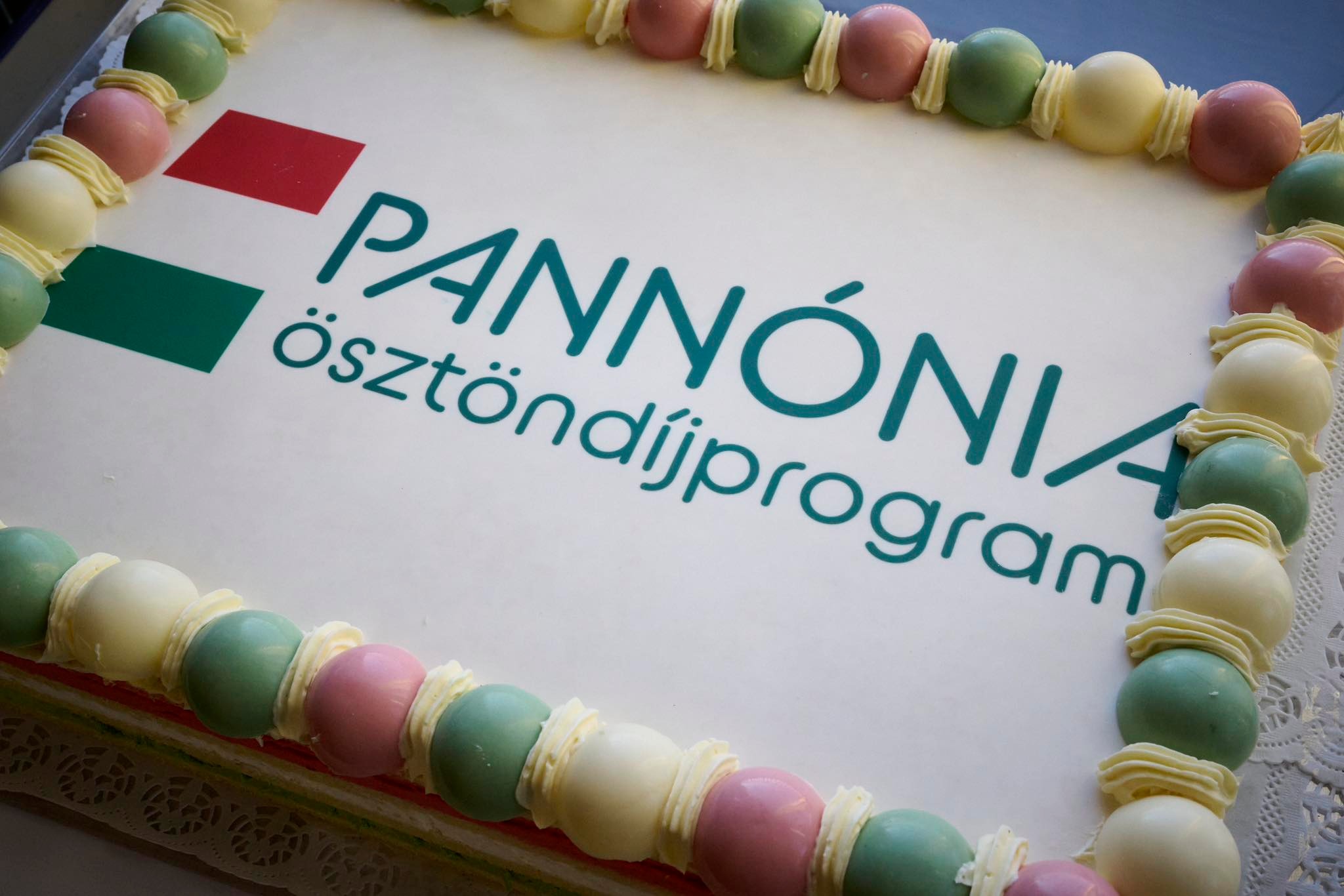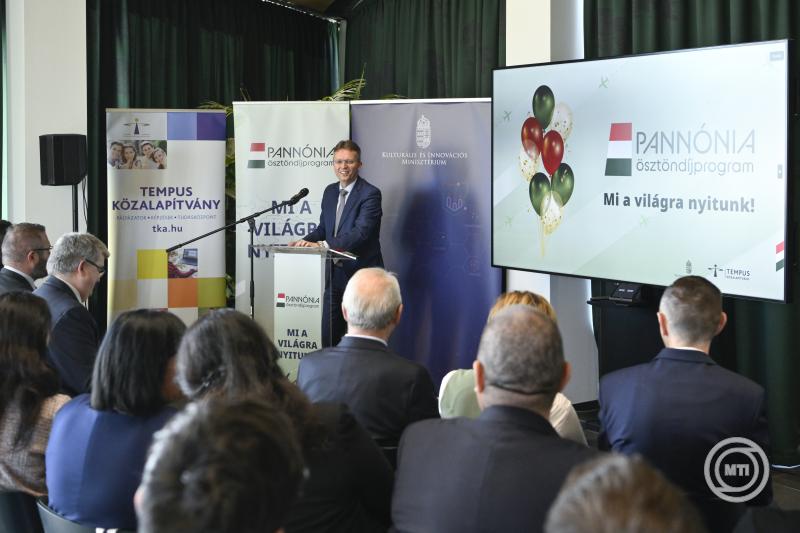Balázs Hankó at Corvinus: The Success of Young People is the Success of the Nation

The minister stated that in the first semester, 3,042 participants took part in the mobility program, gaining access to leading universities worldwide, including institutions in the United States, Japan, China, and the United Kingdom. He added that the number of participants is expected to reach 5,000 in the second semester, enabling at least 8,000 students, faculty members, and researchers annually to gain international experience through the program.
Hankó emphasized that Brussels was unable to prevent Hungarian university students from engaging in international relations “without moral and legal grounds” because, as he put it, “we are successful, we shake things up, and we create something better, something new.” He described the Pannonia Program as a way to showcase the excellence of Hungarian higher education and students
The minister highlighted that the government aims to provide all possible opportunities for university students and will allocate HUF 10 billion for the mobility program again this year, as it did in 2024. He stressed that the program was designed based on student needs, as they were consulted about their priorities. One key concern was full credit recognition, ensuring that time spent abroad would not delay graduation. “Erasmus couldn’t achieve this,” he remarked.
Hankó also pointed out the program’s flexibility, allowing students to apply for short-term, multi-month, or semester-long mobility options. Additionally, he emphasized that while Erasmus funds are disbursed retrospectively, Pannonia provides scholarships in advance, and at a higher amount. For example, whereas a four-month Erasmus grant for studying in Germany amounts to HUF 1 million, the Pannonia Program offers HUF 1.5 million for the same mobility.
According to the minister, the program has already established 4,045 university partnerships, and the international experience gained by young people strengthens both the Hungarian nation and economy. “We are opening up to the world,” he said, reiterating the program’s motto.
Lajos György Szabó: Gaining International Experience is Essential
Lajos György Szabó, Vice-Rector of Corvinus University of Budapest, stated that students at Corvinus already study in an international environment, with 20% of the total student body coming from abroad. However, he emphasized the importance of students going abroad to gain international experience. He noted that the university’s model change provided an excellent opportunity to further enhance the quality of education and research and to raise the institution’s visibility on an international scale.
Péter Sótonyi, Rector of the University of Veterinary Medicine, expressed strong criticism, calling it a “vile and disgraceful act” that Hungarian model-changing universities were excluded from Erasmus. However, he noted that this did not succeed in turning young people against the government. Instead, the Pannonia Scholarship Program has opened the world to students, allowing them to travel not only within Europe but globally. “This is an incredible success story,” he said, adding that it is particularly gratifying that the program includes not only students but also faculty members.
Károly Czibere, Chairman of the Board of Trustees of the Tempus Public Foundation, described the Pannonia Scholarship Program as an innovative initiative that has expanded opportunities and offers much more than Erasmus.
Marcell Eszterhai, President of the National Conference of Student Governments (HÖOK), expressed his satisfaction that the Pannonia Scholarship Program has finally resolved the issue of recognizing credits earned abroad, making life significantly easier for students. He also praised the establishment of the student ambassador system, which enables students participating in mobility programs to share their experiences.
(MTI, Photo: Facebook page of Balázs Hankó)

A miniszter kiemelte: a kormány minden lehetőséget biztosítani kíván az egyetemistáknak, ezért 2024-hez hasonlóan idén is tízmilliárd forintot fordítanak a mobilitási program megvalósítására. Szavai szerint fontosnak tartották, hogy a programot az egyetemisták igényeire szabva alkossák meg, ezért megkérdezték a fiatalokat, hogy mi fontos nekik. Az egyik ilyen szempont a teljes kreditelismerés volt, vagyis hogy a külföldön töltött idő ne késleltesse a diplomaszerzést. “Ez az Erasmusnak nem jött össze” – jegyezte meg.
Elmondta: szükségesnek tartották a rugalmasságot is, ezért néhány hetes, több hónapos és féléves utazásokra is lehet pályázni. Hankó Balázs kiemelte azt is, hogy míg az Erasmus programban a pénz utólag érkezik, a Pannónia esetében a hallgatók előre megkapják az ösztöndíjat, ami egyébként magasabb összegű is, mint az erasmusos. Példaként említette, hogy míg egy négyhónapos németországi mobilitás ösztöndíja Erasmussal egymillió forint, addig a Pannónia program ugyanerre másfél millió forintot biztosít.
A miniszter közölte: a program révén már 4045 egyetemi kapcsolat szövődött, a fiatalok külföldi tapasztalatai pedig a magyar nemzetet, a magyar gazdaságot erősítik. “Mi a világra nyitunk”, hangzik a program mottója, és ez ténylegesen így van – húzta alá a tárcavezető.
Szabó Lajos György: fontos a nemzetközi tapasztalatszerzés
Szabó Lajos György, a Budapesti Corvinus Egyetem rektorhelyettese elmondta: a Corvinuson itthon is nemzetközi környezetben tanulhatnak a hallgatók, mert az összlétszám húsz százaléka külföldi. Ezzel együtt nagyon fontos, hogy a fiatalok eljussanak külföldre és nemzetközi tapasztalatokat szerezzenek. Szavai szerint a modellváltás kiváló lehetőséget adott arra, hogy az oktatás és a kutatás színvonalát tovább növeljék, valamint, hogy nemzetközi mércével mérve is láthatóvá tegyék az egyetemet.
Sótonyi Péter, az Állatorvostudományi Egyetem rektora úgy fogalmazott: “aljas, galád dolog”, hogy az Erasmus lehetőségét megszüntették a magyar modellváltó egyetemek hallgatói számára, de így sem sikerült a kormány ellen hangolni a fiatalokat. A Pannónia Ösztöndíjprogrammal kinyílt a világ a fiatalok előtt, akik nem csak Európába mehetnek, hanem a világ minden részére – fogalmazott. “Ez olyan sikertörténet, amely felbecsülhetetlen” – hangsúlyozta, hozzátéve: külön öröm, hogy nemcsak hallgatók, hanem oktatók is részt vehetnek a programban.
Czibere Károly, a Tempus Közalapítvány kuratóriumi elnöke arról beszélt: a Pannónia Ösztöndíjprogram innovatív program, ami kiszélesítette a lehetőségeket, és sokkal többet kínál, mint az Erasmus.
Eszterhai Marcell, a Hallgatói Önkormányzatok Országos Konferenciája (HÖOK) elnöke örömét fejezte ki, hogy a Pannónia Ösztöndíjprogramnak köszönhetően “végre rendeződött a külföldön szerzett kreditek elismerése”. Jelezte, ez jelentős könnyebbséget jelent a hallgatóknak. Méltatta továbbá a hallgatói nagyköveti rendszer kialakítását is, ami lehetővé teszi, hogy a mobilitásban részt vevő hallgatók megosszák a tapasztalataikat.
(Szöveg: MTI, Kép: Hankó Balázs Facebook-oldala)